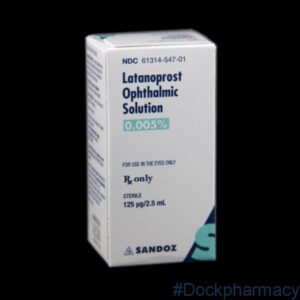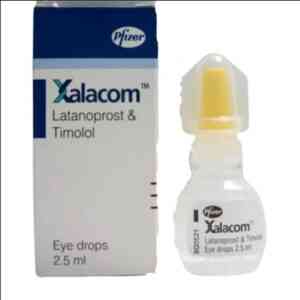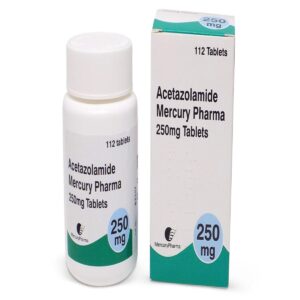- Active Ingredient: timolol
- Treatment of Glaucoma
- Prescription Product
Timoptol Eye Drops 0.25%, 5ml
What Timoptol Eye Drops 0.25% is and what it is used for?
Timoptol Eye Drops 0.25% contains a substance called timolol which belongs to a group of medicines called beta-blockers. Timolol lowers the pressure in your eye(s).
Timoptol Eye Drops 0.25% is used to treat glaucoma, when the pressure in the eye is raised.
What is Glaucoma?
Glaucoma is a common eye condition where the optic nerve, which connects the eye to the brain, becomes damaged.
It’s usually caused by fluid building up in the front part of the eye, which increases pressure inside the eye.
Your eye contains a clear, watery liquid that feeds the inside of the eye. Liquid is constantly being drained out of the eye and new liquid is made to replace this. If the liquid cannot drain out quickly enough, the pressure inside the eye builds up. This medicine works by increasing the amount of liquid that is drained. This reduces the pressure inside the eye. If the high pressure is not reduced, it could lead to a disease called glaucoma and eventually damage your sight.
Glaucoma can lead to loss of vision if it’s not diagnosed and treated early.
It can affect people of all ages, but is most common in adults in their 70s and 80s.
Glaucoma does not usually cause any symptoms to begin with.
It tends to develop slowly over many years and affects the edges of your vision (peripheral vision) first.
For this reason, many people do not realise they have glaucoma, and it’s often only picked up during a routine eye test.
If you do notice any symptoms, they might include blurred vision, or seeing rainbow-coloured circles around bright lights.
Both eyes are usually affected, although it may be worse in 1 eye.
Very occasionally, glaucoma can develop suddenly and cause:
Visit an opticians or a GP if you have any concerns about your vision.
If you have glaucoma, early diagnosis and treatment can help stop your vision getting worse.
Without treatment, glaucoma can eventually lead to blindness.
If you develop symptoms of glaucoma suddenly, go to your nearest eye casualty unit or A&E as soon as possible.
This is a medical emergency that may require immediate treatment.
There are several different types of glaucoma.
The most common is called primary open angle glaucoma. This tends to develop slowly over many years.
It’s caused by the drainage channels in the eye becoming gradually clogged over time.
Other types of glaucoma include:
- acute angle closure glaucoma – an uncommon type caused by the drainage in the eye becoming suddenly blocked, which can raise the pressure inside the eye very quickly
- secondary glaucoma – caused by an underlying eye condition, such as inflammation of the eye (uveitis)
- childhood glaucoma (congenital glaucoma) – a rare type that occurs in very young children, caused by an abnormality of the eye
Glaucoma can occur for a number of reasons.
Most cases are caused by a build-up of pressure in the eye when fluid is unable to drain properly.
This increase in pressure then damages the nerve that connects the eye to the brain (optic nerve).
It’s often unclear why this happens, although certain things can increase the risk, including:
- your age – glaucoma becomes more common as you get older
- your ethnicity – people of African, Caribbean or Asian origin are at a higher risk
- your family history – you’re more likely to develop glaucoma if you have a parent or sibling with the condition
- other medical conditions – such as short-sightedness, long-sightedness and diabetes
It’s not clear whether you can do anything to prevent glaucoma, but having regular eye tests should pick it up as early as possible.
The treatment recommended for you will depend on the type of glaucoma you have, but the options are:
- eyedrops – to reduce the pressure in your eyes
- laser treatment – to open up the blocked drainage tubes or reduce the production of fluid in your eyes
- surgery – to improve the drainage of fluid
You’ll also probably need regular appointments to monitor your condition and check the treatment is working.
Further Information on Glaucoma
Timoptol Eye Drops 0.25% Reviews
After using Timoptol Eye Drops 0.25%, it’s helpful to let others know about your experience. Reviews of an item help other users know that medicines received have helped the condition it is claimed for, how well the treatment worked or any issues to be aware of. We invite our users to leave a review of both their treatment and of the service provided. Click on the reviews tab to see if there has been feedback on this item.
Price of Timoptol Eye Drops 0.25% in UK
Where to buy Timoptol Eye Drops 0.25%
Timoptol Eye Drops 0.25% is available to buy with a prescription at Dock Pharmacy Essex UK, UK Online Pharmacy.
You can buy Timoptol Eye Drops 0.25% uk with a private prescription or with a vets prescription.
Related Article
Brand
Timoptol
How To Use
How to use Timoptol 0.25% Eye drops
The usual dose of Timoptol eye drops is one drop in the affected eye(s) twice each day:
- one drop in the morning
- one drop in the evening.
Please read the Patient Information Leaflet before using
Warnings/ Side Effects
Do not use Timoptol 0.25% eye drops if:
- you are allergic (hypersensitive) to timolol, beta-blockers or any of the other ingredients of Timoptol (see section 6 for Further Information)
- you have now or have had in the past respiratory problems such as asthma, severe chronic obstructive bronchitis (severe lung disease which may cause wheeziness, difficulty in breathing and/or long-standing cough)
- you have heart problems
- slow heart beat
- disorders of heart rhythm (irregular heart beats)
- heart failure
- “cardiogenic shock” – a serious heart condition caused by very low blood pressure, which may result in the following symptoms: dizziness and lightheadedness, fast pulse rate, white skin, sweating, restlessness, loss of consciousness.
If you are not sure whether you should use Timoptol talk to your doctor or pharmacist.
Take special care with Timoptol
Before you use this medicine tell your doctor if you have now or have had in the past
- coronary heart disease (symptoms can include chest pain or tightness, breathlessness or choking), heart failure
- low blood pressure
- disturbances of heart rate such as slow heart beat
- breathing problems, asthma or chronic obstructive pulmonary disease
- poor blood circulation disease (such as Raynaud’s disease or Raynaud’s syndrome)
- diabetes as timolol may mask signs and symptoms of low blood sugar
- overactivity of the thyroid gland as timolol may mask signs and symptoms
- you wear soft contact lenses. Your eye drops contain a preservative which can be deposited on soft contact lenses. It is important that your lenses are removed before using your eye drops and not put back into your eyes for 15 minutes.
Tell your doctor before you have an operation that you are using Timoptol as timolol may change effects of some medicines used during anaesthesia.
If your eye becomes irritated or any new eye problems come on, talk to your doctor straight away. Eye problems could include redness of the eye or swelling of the eyelids (see Section 4: Possible Side Effects).
If you suspect that Timoptol is causing an allergic reaction or hypersensitivity (for example, skin rash, or redness and itching of the eye), stop using Timoptol and contact your doctor immediately.
Tell your doctor if:
- you get an eye infection
- you injure your eye or have an operation on it
- your eye problems get worse or you get any new symptoms.
Use in children and adolescents
There is only very limited data available on the use of timolol in infants and children. For example, in one small clinical study, timolol, the active ingredient in Timoptol eye drops, has been studied in infants and children aged 12 days to 5 years, who have elevated pressure in the eye(s) or have been diagnosed with glaucoma. For more information, talk to your doctor.
Timoptol should generally be used with caution in young patients. In newborns, infants and younger children Timoptol should be used with extreme caution. If coughing, wheezing, abnormal breathing or abnormal pauses in breathing (apnoea) occur, the use of the medication should be stopped immediately. Contact your doctor as soon as possible. A portable apnoea monitor may also be helpful.
Using other medicines
Timoptol can affect or be affected by other medicines you are using, including other eye drops for the treatment of glaucoma. Tell your doctor if you are using or intend to use medicines to lower blood pressure, heart medicine or medicines to treat diabetes. Please tell your doctor or pharmacist if you are taking or have recently taken any other medicines, including other eye drops or medicines obtained without a prescription.
It is important to tell your doctor before using Timoptol if you are taking one or more of the following medicines:
- a calcium antagonist, such as nifedipine, verapamil or diltiazem, often used to treat high blood pressure, angina, an abnormal heartbeat or Raynaud’s syndrome
- digoxin, a medicine used to relieve heart failure or treat abnormal heartbeat
- medicines known as catecholamine-depleting agents, such as rauwolfia alkaloids or reserpine, used for high blood pressure
- medicines called pressor amines, such as adrenaline used to treat severe allergic reaction
- quinidine (used to treat heart conditions and some types of malaria)
- antidepressants known as fluoxetine and paroxetine
- clonidine, a medicine used to treat high blood pressure
- other beta-blockers taken by mouth or used as eye drops, because they belong to the same group of medicines as Timoptol and could have an additive effect.
Pregnancy and breast-feeding
Ask your doctor for advice before taking any medicine.
Use in pregnancy
Do not use Timoptol if you are pregnant unless your doctor considers it necessary.
Use in breast-feeding
Do not use Timoptol if you are breast-feeding. Timolol may get into your milk. Ask your doctor for advice before taking any medicine during breast-feeding.
Driving and using machines
There are possible side effects associated with Timoptol, such as dizziness, tiredness and changes in your eyesight, such as blurred vision, drooping of the upper eyelid (making the eye stay half closed), double vision which may affect your ability to drive and/or operate machinery. Do not drive and/or operate machinery until you feel well and your vision is clear.
Ingredient
Timoptol® 0.25% w/v Eye Drops Solution contains timolol (as maleate)
1 review for Timoptol Eye Drops 0.25%, 5ml
Only logged in customers who have purchased this product may leave a review.
Questions and answers of the customers
There are no questions yet, be the first to ask something for this product.
You Might Also Like
Original price was: £14.50.£7.90Current price is: £7.90.
- You can buy Latanoprost eye drops for dogs and cats online with a Vet valid prescription.
- Treatment for Glaucoma
Learn More
Original price was: £14.50.£7.90Current price is: £7.90.
- Availability: in stock
Original price was: £20.05.£18.50Current price is: £18.50.
- Treatment of Glaucoma
- Active Ingredients: latanoprost and timolol.
- Prescription Product
- Vet Prescription Accepted
Original price was: £20.05.£18.50Current price is: £18.50.
- Availability: in stock
Other Products From This Seller
Original price was: £63.00.£15.95Current price is: £15.95.
Dunhill Icon Racing Green Eau de Parfum Sprays, 100ml Embrace the thrill of sophistication with Dunhill Icon Racing Green Eau de Parfum, 100ml, a fresh and woody fragrance for men inspired by the spirit of speed and elegance. This luxurious scent from Dunhill blends invigorating citrus top notes with a warm woody base, making it […]
Learn MoreOriginal price was: £63.00.£15.95Current price is: £15.95.
- Availability: in stock
Original price was: £45.00.£18.95Current price is: £18.95.
Guy Laroche Drakkar Noir Eau de Toilette Spray, 100ml Bold and Aromatic Men’s Fragrance Exude timeless masculinity with Guy Laroche Drakkar Noir Eau de Toilette Spray, 100ml, an iconic men’s fragrance that blends boldness and sophistication. Launched by Guy Laroche, this classic scent remains a favorite for men seeking a powerful and confident aroma. Drakkar […]
Learn MoreOriginal price was: £45.00.£18.95Current price is: £18.95.
- Availability: in stock
Original price was: £49.00.£24.95Current price is: £24.95.
Dunhill Desire Blue for Men Eau de Toilette, 100 ml Dive into elegance and freshness with Dunhill Desire Blue for Men Eau de Toilette, 100ml, a fresh and aquatic fragrance that embodies sophistication and charm. Crafted for the modern man, this invigorating scent blends crisp citrus, aromatic herbs, and warm woody undertones to create a […]
Learn MoreOriginal price was: £49.00.£24.95Current price is: £24.95.
- Availability: in stock
Original price was: £33.95.£14.95Current price is: £14.95.
David Beckham Classic Eau de Toilette 90ml Sophisticated and Woody Fragrance for Men Step into timeless sophistication with David Beckham Classic Eau de Toilette, 90ml, a woody and citrus fragrance for men that exudes confidence and style. Designed for the modern gentleman, this iconic scent captures the elegance and charisma synonymous with David Beckham. Whether […]
Learn MoreOriginal price was: £33.95.£14.95Current price is: £14.95.
- Availability: in stock
Original price was: £40.00.£19.99Current price is: £19.99.
ARMAF Club De Nuit Intense Man Eau De Parfum, 30ml Bold and Long-Lasting Fragrance for Men Elevate your presence with ARMAF Club De Nuit Intense Man Eau De Parfum, 30ml, a bold and woody fragrance for men that exudes sophistication and confidence. Crafted for the modern gentleman, this luxurious scent combines fresh citrus, aromatic spices, […]
Learn MoreOriginal price was: £40.00.£19.99Current price is: £19.99.
- Availability: in stock
Original price was: £35.00.£18.95Current price is: £18.95.
Calvin Klein CK IN2U Him Eau De Toilette 50ml Fresh, Spicy, and Woody Fragrance Celebrate youth, energy, and spontaneity with Calvin Klein CK IN2U Him Eau De Toilette, 50ml, a fresh and spicy fragrance for men. This dynamic scent perfectly balances invigorating citrus top notes with warm woody undertones, embodying the spirit of modern masculinity. […]
Learn MoreOriginal price was: £35.00.£18.95Current price is: £18.95.
- Availability: in stock
Original price was: £66.00.£19.95Current price is: £19.95.
Calvin Klein Man Eau de Toilette 100ml Fresh, Bold, and Woody Fragrance for Men Define your masculinity with Calvin Klein Man Eau de Toilette, 100ml, a fresh and woody fragrance for men that embodies confidence, sophistication, and modernity. This bold scent blends crisp and spicy notes with warm undertones, making it an ideal choice for […]
Learn MoreOriginal price was: £66.00.£19.95Current price is: £19.95.
- Availability: in stock
Original price was: £38.00.£22.99Current price is: £22.99.
BURBERRY Weekend For Men Edt Spray, 30 ml Fresh and Casual Fragrance Relax in style with BURBERRY Weekend For Men Eau de Toilette Spray, 30ml, a fresh and citrusy fragrance for men that perfectly embodies casual elegance. Designed for modern, relaxed men, this scent balances refreshing citrus top notes with warm, woody undertones. Ideal for […]
Learn MoreOriginal price was: £38.00.£22.99Current price is: £22.99.
- Availability: in stock
Original price was: £36.00.£24.95Current price is: £24.95.
BURBERRY Touch For Men Eau de Toilette 30ml Fresh and Woody Fragrance Experience the refined elegance of BURBERRY Touch For Men Eau de Toilette, 30ml, a fresh and woody fragrance for men that captures the essence of modern masculinity. Perfectly balanced with refreshing and warm notes, this iconic scent is ideal for everyday wear and […]
Learn MoreOriginal price was: £36.00.£24.95Current price is: £24.95.
- Availability: in stock
Original price was: £9.95.£4.95Current price is: £4.95.
Aqua Man DC Pour Homme Eau De Parfum 100ml Bold and Fresh Aquatic Fragrance for Men Unleash your inner hero with Aqua Man DC Pour Homme Eau De Parfum, 100ml, a fresh and aquatic fragrance for men that embodies strength, confidence, and charisma. Inspired by the iconic DC superhero Aqua Man, this invigorating scent is […]
Learn MoreOriginal price was: £9.95.£4.95Current price is: £4.95.
- Availability: in stock


















Anonymous (verified owner) –